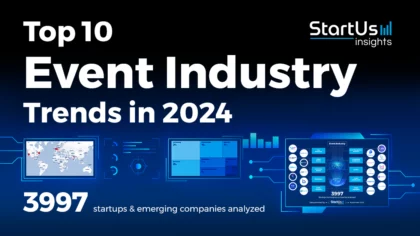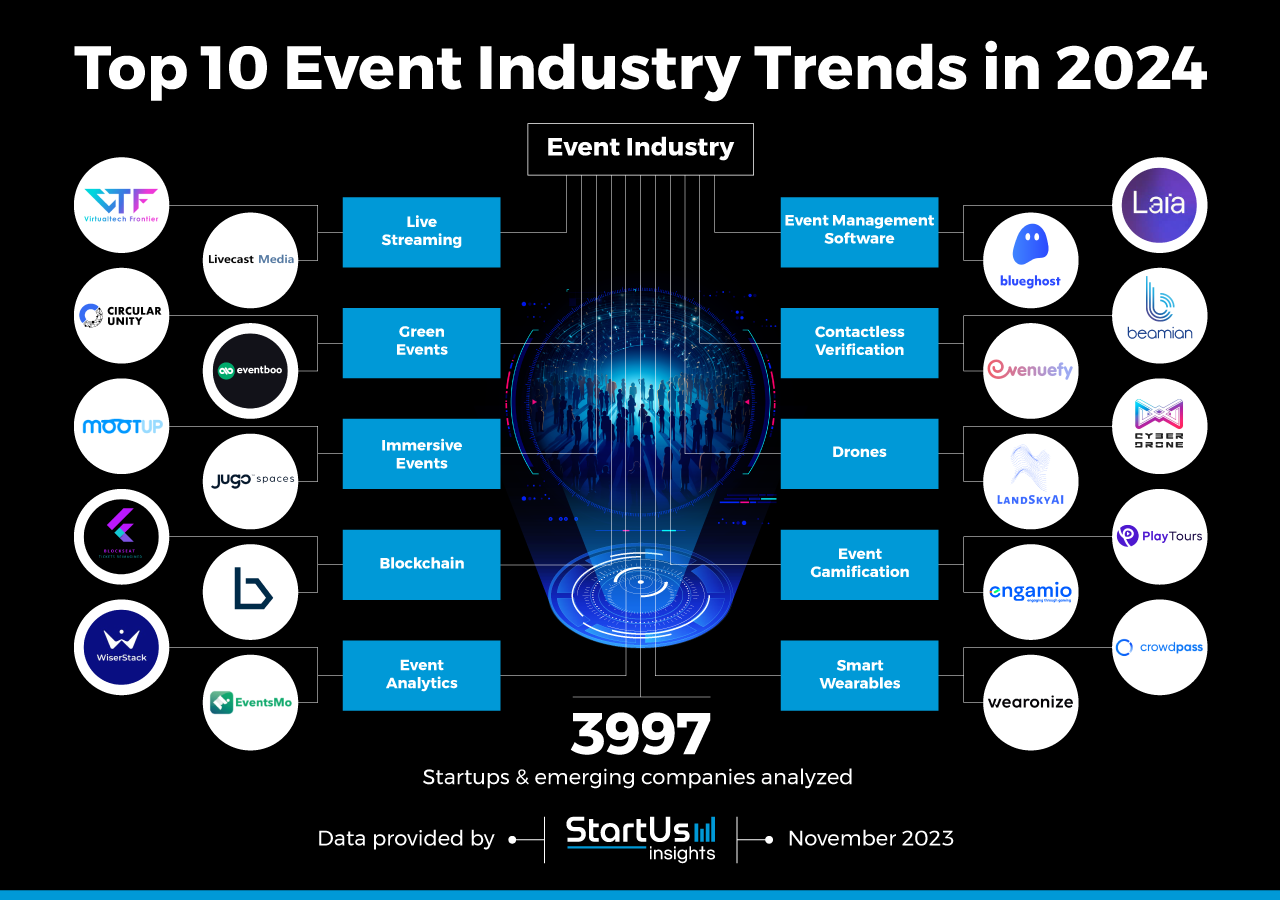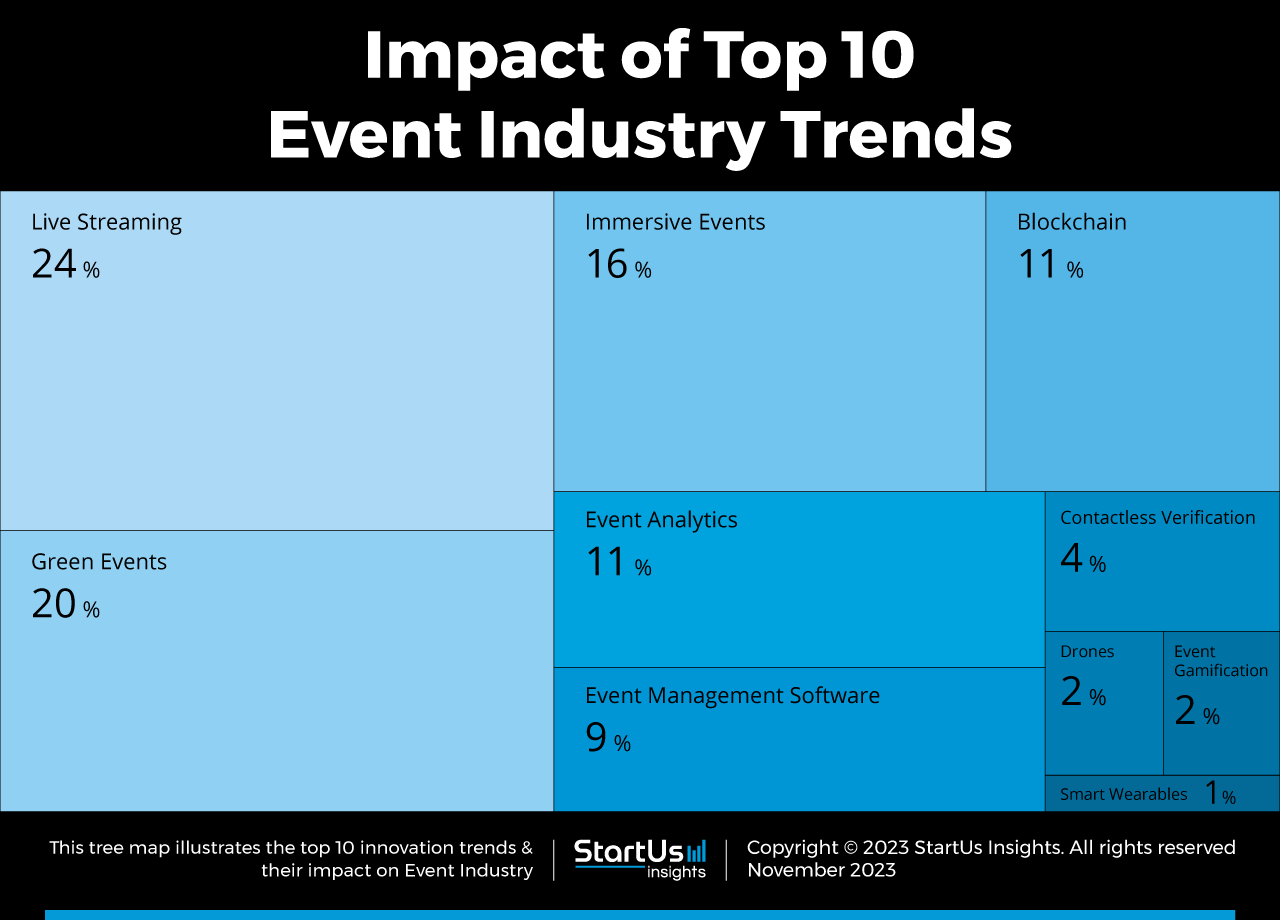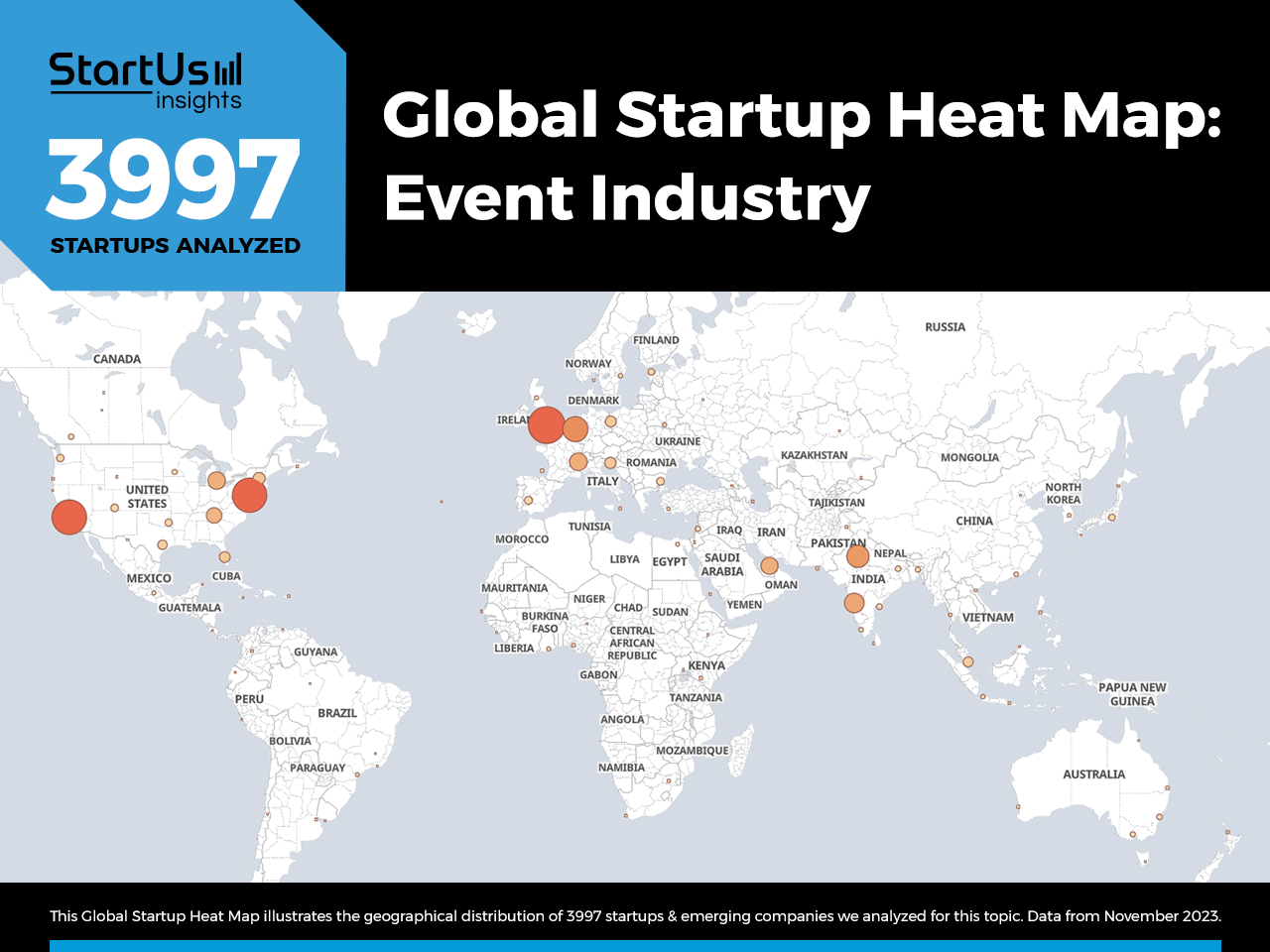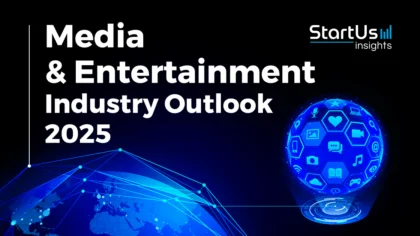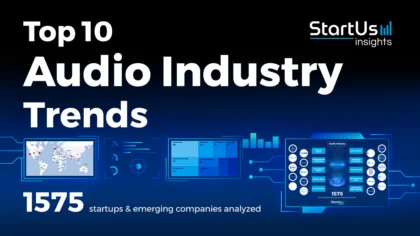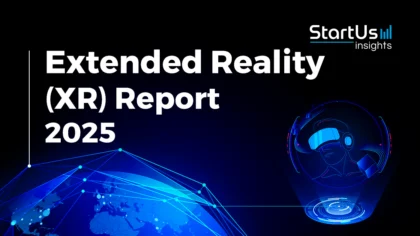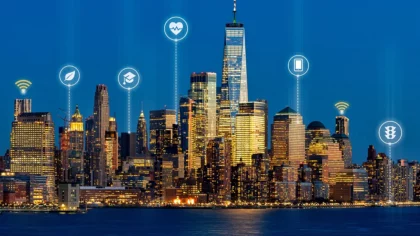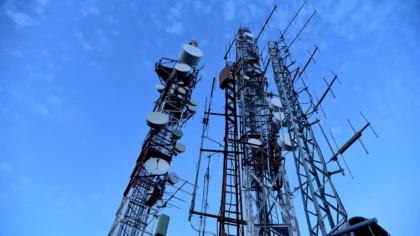Accelerate Productivity in 2025
Reignite Growth Despite the Global Slowdown
Event technology is becoming a game changer in planning, executing, and experiencing events. Traditionally, event organizers spend countless hours manually sending invitations, onboarding clients, managing long queues, coordinating with vendors, and analyzing performance results.
Startups are leveraging artificial intelligence AI, immersive technologies, and data analytics to streamline event operations, boost attendee engagement, and enhance overall event success. Further, the event industry trends in this report highlight the role of providing valuable data on attendees that transforms event planning and marketing strategies.
What are the top trends in the Events Industry?
- Live Streaming
- Green Events
- Immersive Events
- Blockchain
- Event Analytics
- Event Management Software
- Contactless Verification
- Drones
- Event Gamification
- Smart Wearables
Innovation Map outlines the Top Event Industry Trends & 20 Promising Startups
For this in-depth research on the top event industry trends & startups, we analyzed a sample of 3997 global startups & scaleups. This data-driven research provides innovation intelligence that helps you improve strategic decision-making by giving you an overview of emerging technologies in the events industry. In the Event Industry Innovation Map below, you get a comprehensive overview of the innovation trends & startups that impact your company.
These insights are derived by working with our Big Data & Artificial Intelligence-powered StartUs Insights Discovery Platform, covering 3 790 000+ startups & scaleups globally. As the world’s largest resource for data on emerging companies, the SaaS platform enables you to identify relevant technologies and industry trends quickly & exhaustively.
Tree Map reveals the Impact of the Top Event Industry Trends
Based on the Event Industry Innovation Map, the TreeMap below illustrates the impact of the top 10 event industry trends. Startups are now utilizing AI, robotic process automation (RPA), and contactless technology to streamline event management, facilitate verification, and maximize profits.
With the rise of live event streaming, event planners broadcast events online to a broader global audience, thus enhancing accessibility, engagement, and impact. Moreover, global awareness of sustainability is reshaping the industry. Digitalization enables green event practices like digital ticketing, LED lighting, and mobile apps to reduce paper consumption and energy use.
Event startups also incorporate blockchain and NFC technology for transparent and secure payments. The use of smart wearables equipped with NFC, QR codes, and RFID technology enables instant verification and cashless payments. Further, startups leverage AI and computer vision to collect significant data on the attendees’ behavior during the event.
Moreover, intelligent chatbots provide instant support to streamline event management. Lastly, other innovative trends such as immersive technologies, event gamification, and drone performance create more memorable experiences for patrons.
Global Startup Heat Map covers 3997 Event Industry Startups
The Global Startup Heat Map below highlights the global distribution of the 3500+ exemplary startups & scaleups that we analyzed for this research. Created through the StartUs Insights Discovery Platform, the Heat Map reveals high startup activity in the US and UK, followed by India and Western Europe.
Below, you get to meet 20 out of these 3500+ promising startups & scaleups as well as the solutions they develop. These event industry startups are hand-picked based on criteria such as founding year, location, funding raised & more. Depending on your specific needs, your top picks might look entirely different.
Interested in exploring all 3500+ event industry startups & scaleups?
Top 10 Event Industry Trends & Innovations in 2024
1. Live Streaming
The COVID pandemic has spurred rapid changes in the events industry, creating a landscape where remote access to live events has become commonplace. Live streaming platforms allow event planners to expand their audience beyond the physical walls of a venue, allowing an unlimited number of viewers to access events, in real time.
Live streaming content, including webcasts, podcasts, and videos, is broadcast globally at the audience’s convenience. In addition, live-streaming solutions are cost-effective and reduce the carbon footprint of event companies. Moreover, live event streaming provides more easily measurable performance and engagement metrics, thus leading to higher revenue streams.
Virtualtech Frontier develops a Live Streaming Platform
Malaysian startup Virtualtech Frontier offers a live-streaming platform for event organizers to broadcast interactive live-stream events. It further enables live selling to attract viewers with engaging interactions, thus boosting publicity and maximizing sales. This solution allows businesses to promote their products with animations and eye-catching graphics.
Virtualtech Frontier enables event organizers to reach a larger audience by broadcasting across all channels directly, establishing better relationships between brands and customers.
Livecast Media offers a Live Stream Events Platform
Canadian startup Livecast Media provides a web platform for video production teams to elevate their virtual or hybrid live-streamed events. It allows users to instantly create event pages through which attendees access the live stream. The platform incorporates a set of tools such as live polling and word clouds to add an interactive dimension to events, thus fostering engagement and collecting valuable instant feedback.
Through the simultaneous interpretation system, video producers easily generate translated versions of live streams, thus enhancing accessibility for a global reach. Notably, Livecast Media’s intuitive management dashboard empowers video producers with real-time control over their events. Overall, the solution contributes to a more immersive, inclusive, and engaging event experience.
2. Green Events
With increasing awareness of global environmental challenges, the events industry also recognizes the need for sustainable practices. Eco-friendly venues with sustainable materials, energy efficiency, and zero-waste practices are gaining momentum. Startups employ technology to ensure that the event operations are aligned with the sustainability goals.
To unlock green events, the organizers take initiatives to reduce waste and incorporate renewable energy sources. For example, event organizers take initiatives to eliminate single-use plastics and replace them with biodegradable or reusable alternatives.
Effective strategies to promote event sustainability include the adoption of digital platforms to replace printed materials, the utilization of event analytics to optimize resources, and virtual attendance to reduce traveling. Startups and scaleups leverage NFC technology, and QR codes to this end. Moreover, advances in technology enable carbon emissions tracking, raising awareness of an event’s carbon footprint.
Circular Unity provides an Event Sustainability Platform
Portuguese startup Circular Unity develops a platform that conducts automated sustainability assessments by accurately measuring sustainability KPIs. Its dashboard allows event organizers to track real-time resource usage and the carbon footprint. The startup leverages IoT sensors and AI-based computer vision to collect valuable data from suppliers for water, energy, heat, waste, and vehicle meters.
Circular Unity helps event organizers simplify sustainability management by providing actionable insights to reduce emissions and set targets for net-zero emissions.
Eventboo provides Virtual Assistants
Canadian startup Eventboo develops virtual assistants for planning and managing sustainable events. The solution leverages the power of artificial intelligence (AI) to guide event organizers to eco-friendly practices to follow in different stages of the event. In this regard, it further helps them to connect with eco-responsible event providers of sustainable products or services such as event rooms, equipment, decorations, and more.
Moreover, Eventboo integrates a carbon calculator to evaluate the ecological footprint generated during events. It also organizes and encourages event carpooling between the attendees, thus considerably reducing carbon footprint. The startup promotes a circular economy for the event industry.
3. Immersive Events
The extensive use of immersive technologies stands out as one of the most transformative elements in the event technologies. Startups leverage augmented and virtual reality (AR/VR) to enhance the attendee experience by offering memorable and interactive onsite experiences. Through AR, attendees unlock interactive content including 3D models, videos, and games.
Moreover, AR booths allow for immersive product demos and enhance attendee engagement with gamification. Further, VR immerses attendees in a fully simulated environment and allows them to interact with others in real time. These technologies enable event organizations to enhance the overall attendee experience, maximizing sales for events.
MootUp develops an Immersive 3D Virtual Event Platform
US-based startup MootUp offers a 3D virtual reality event platform for organizers to host immersive events accessible from any device. The platform integrates 3D avatars and other interactive features to increase attendee engagement. The 3D avatar-driven environment allows attendees to communicate through personalized avatars, chats, gestures, and voice.
Hence, the platform enables event planners to customize virtual venues and create memorable events that foster collaboration, creativity, and innovation. MootUp’s virtual event software helps businesses reach a global audience by hosting events using web-based 3D, thereby maximizing profits.
Jugo Spaces specializes in Virtual Events Technology
UK-based startup Jugo Spaces creates virtual events instantly through AI-powered green screens. The aim is to increase engagement and involvement by placing attendees in immersive 3D virtual rooms. Moreover, the platform facilitates role swaps between event hosts and audience members in a matter of clicks.
In addition, it helps event organizers conduct events such as webinars, online master classes, and conferences within virtual rooms designed using logos, colors, and more. Jugo Spaces helps event businesses enhance brand awareness, build strong relationships, and create memorable events.
4. Blockchain
The event industry is increasingly adopting blockchain technology as a transparent and immutable ledger for secure and efficient transactions. Notably, it is utilized for ticket sales, supplier contracts, speaker payments, and incentivizing audiences. Hence, it helps streamline operations and foster trust among stakeholders. Startups offer blockchain-based NFT ticketing apps to combat fraudulent ticketing and skyrocketing prices in the secondary markets.
Further, event organizers use blockchain to decentralize the ticketing system, enabling them to accept cryptocurrency as an alternative medium of exchange for tickets, food, vouchers, and more. As this process is transparent, secure, and efficient, it eventually reduces costs for event management operations. Blockchain technology also confirms the authenticity of vendors providing services, allowing event planners to book services and make payments instantly.
Blockseat specializes in Blockchain-based NFT Ticketing
US-based startup Blockseat develops a blockchain ticketing app that enables event planners to sell tickets on the chain as NFTs. The use of blockchain and NFT technology ensures full transparency within the ticketing lifecycle and reduces costs associated with the verification of the authenticity of tickets.
The platform helps eliminate fraudulent tickets, reduces black market ticket selling, and controls secondary market ticket prices. Blockseat’s smart contracts enable new revenue streams for event organizers due to them benefiting from secondary market sales via royalties.
B.A.M Ticketing enables NFT Ticketing
Austrian startup B.A.M Ticketing specializes in high-speed NFT ticketing transactions for the live events industry. The blockchain-powered platform aims to eliminate black market trading and counterfeit-proof tickets that cannot be resold at exorbitant prices.
The application is supported by smart blockchain sharding, scaling, and load-balancing algorithms. Further, event organizers can integrate the application with the live event infrastructure via API services and SDKs. The startup enables them to generate revenue by secondary market trading, increase ticket availability, and ensure fair prices for the customers.
5. Event Analytics
The adoption of data analytics is gaining traction in the event industry. Event analytics allows event planners to make data-driven decisions by providing real-time insights into attendance, behavior, feedback, engagement, or social media activity. Startups employ technology to enable real-time data collection, integrated with sophisticated AI algorithms to provide instant insights. This data is utilized to optimize future events and curate personalized experiences for attendees.
WiserStack provides Visual Event Analytics
Indian startup WiserStack provides visual event analytics for event planners to identify gate crashers at entry or exit points. The platform integrates smart cameras for real-time attendee count, and its algorithms enable quick checks of new faces every minute. Further, it allows for monitoring real-time metrics on impressions, engagement, leads, and more.
Through WiseStack, event planners conduct transparent billing, enhance revenues, and deliver a better guest experience. Lastly, visual event analytics help sponsors gain more visibility over ROI for online and offline events.
Events Mo collects Real-Time Event Data
Nepal-based startup Events Mo provides real-time event metrics to enhance future event results. With analytical insights, event planners measure attendee engagement and content relevance, determine the most successful sessions, and plan better events tailored to trending topics.
Moreover, the platform records data on ticket sales, registration, and direct traffic using visual graphs, thus empowering event organizers to gather and interpret event data instantly. EventsMo enhances the overall event experience, boosts engagement, connects attendees, and increases revenues.

6. Event Management Software
With event management software, event planners automate many aspects of the event planning process, such as registration, ticketing, marketing, and analytics. These tools provide real-time data on attendee behavior and preferences, allowing event planners to make data-driven decisions and improve the attendee experience.
Moreover, startups leverage robotic process automation (RPA) such as intelligent chatbots, virtual gigs, and trade fairs to answer attendees’ questions and provide important information. By automating customer service, attendees receive a rapid response, and organizers focus more on other aspects of event planning. Further, AI-driven messaging tools provide instant responses to attendee inquiries and offer personalized recommendations.
Laia Events develops an Event Management Platform
Slovakian startup Laia Events provides an AI-powered event management platform that helps event organizers simplify the event onboarding process and maximize conversion. The platform leverages conversational AI for automated support with registrations, answering open questions, and providing guidance to make events unique experiences.
Moreover, this solution easily configures automated invitation forms, customizes multiple ticket types, and automates confirmation emails. Further, event planners create personalized event landing pages using the brand’s logos, themes, colors, fonts, and much more. Laia Events helps event organizers in cutting off costs through automation, save time, and create personalized attendee experiences.
Blueghost specializes in Live Event Management
US-based startup Blueghost develops live event management software to automate tasks, simplify collaboration, and streamline the event’s operations. Hence, instead of sending a vast amount of emails manually to all the stakeholders, event planners can send bulk emails with a few clicks.
Further, the platform allows users to automate data collection, assign tasks, and receive approvals faster. Tasks and discussions around topics allow event planning teams and partners to remain organized and agree on specific details. Blueghost assists complex event organizations in streamlining their operations, increasing efficiency, saving costs, and creating better experiences.
7. Contactless Verification
Event technology startups provide contactless check-in solutions as a vital component for identity verification and ensure an efficient entry process by avoiding lengthy queues. The utilization of contactless technology such as RFID, NFC, and QR codes has become indispensable in the event industry, promising enhanced health safety protocols and a seamless event experience.
Contactless technology facilitates swift event verification, tracking, and check-in procedures. Further, attendees carry a connected device or the event app, which is scanned at multiple locations within the venue. In addition to on-site check-in, QR codes serve multiple purposes, including accessing event details, monitoring attendee presence at the venue, managing session check-ins, and facilitating payments.
Beamian enables Contactless Event Check-In
Beamian is a startup based in Portugal that leverages biometrics technology to enable contactless event check-in for streamlined access control to all event sessions. Physical identifiers such as smart badges and beamers help identify visitors, sites, brands, and exhibitors at the entry points and enhance check-in security, thus creating better experiences for the attendees.
Moreover, using RFID ticketing at events eliminates long queues, delays at entry points, and paper-based check-ins. Beamian contactless check-in event technology provides an efficient entry process by helping event organizers improve event ROI and attendees’ experiences while making better decisions for future events.
Evenuefy specializes in Facial Recognition
US-based startup Evenuefy employs facial recognition technology to streamline event check-in by accurately identifying attendees of in-person, virtual, and hybrid events. The AI-based badge printing using facial recognition provides an additional measure of security and access control.
Using this feature, attendees create and print badges with a few clicks upon completing the event online registration. Further, the event crew uses a smart device to scan the QR code and automatically recognize the identity. Evenuefy offers an innovative solution for event organizations to streamline the security badge printing process and improve overall efficiency.
8. Drones
As unmanned aerial vehicles (UAVs) gain popularity and become more readily available to the public, their applications in the events industry appear limitless. Drones are revolutionizing the organization, execution, and attendee experience of outdoor events, offering capabilities ranging from aerial photography and videography to crowd control and security.
With advancements in technology, event planners are exploring the use of drones to elevate their events and create memorable experiences for the attendees. Drones, equipped with advanced high-resolution cameras record mesmerizing aerial footage of events, providing unique experiences that were previously unattainable. This enables event planners to showcase their events in visually captivating sequences while allowing attendees to revisit their experiences in novel ways.
CYBERDRONE specializes in Drone Development
UAE-based startup CYBERDRONE develops high-performance drones and creates autonomous swarm technology solutions for the event industry. The drones include features like high flight stability, high-speed animation, and reliable dual-frequency global navigation. The startup uses a secured ground operation system that ensures flight stability and facilitates control. It further conducts pre-flight checks before starting the drone show.
Moreover, high-efficiency LEDs integrated into the drones ensure visibility at long distances, thus providing an exciting drone light performance for events. This solution enhances the overall visual and sensory experience for various events such as product launches, annual conferences, company anniversaries, and much more.
LandSkyAI enhances Event Security
US-based startup LandSkyAI uses mini-tethered drones to ensure event security. Utilizing secure data-over-power cables, the portable surveillance systems guarantee uninterrupted operation, enabling comprehensive monitoring. The startup leverages a high-performance drone camera that provides clear images in HD or infrared (IR) to understand complete situational awareness.
Further, vision AI’s lightning-fast image recognition is personalized according to the event’s needs. LandSky AI drone technology empowers event organizations to keep the crowds safe through intelligent alerts in real-time, facilitating quicker conflict resolution and preparing them to respond accordingly.
9. Event Gamification
With the rise of event technology, event gamification is gaining in popularity. Maintaining attendee engagement over extended durations presents a significant challenge for the event organizers as attendees get easily bored or distracted. To this end, event gamification integrates game-like features with the event, such as leaderboards or rewards, to foster attendee interaction and make events more enjoyable.
Advances in VR enable event companies to deliver engaging and interactive content to the audience. Further, businesses utilize gamification to improve brand engagement and make high-performance marketing campaigns for various events.
PlayTours provides Event Gamification
Singapore-based startup PlayTours uses event gamification to encourage attendees to engage with booths and participate in fun activities during events. Through scanning QR codes at their booths, event organizers allow attendees to scan and earn points.
Moreover, the event gamification app motivates attendees to explore different event areas, completing specific challenges by scanning QR codes and revealing clues that guide them to other spaces. Additionally, the app enables event organizers to collect real-time valuable feedback and statistics from attendees, helping them identify areas for improvement in future events.
Engamio develops a Gamification Platform
Canadian startup Engamio offers a gamification platform that designs engaging experiences for attendees of virtual and hybrid events. For example, it enables activities such as interactive map networking, word search contests, virtual selfie booths, and jigsaw puzzle contests added to events.
Further, the platform allows users to customize templates, present them to the audience, and ultimately generate a report with key engagement metrics. Through this gamification solution, event planners boost attendee engagement, drive ROI for sponsors, and generate more profits.
10. Smart Wearables
Event planners face challenges managing crowds, handling visitor registrations with waiting lines and predominantly depending only on post-event surveys to get feedback. Smart wearables incorporate RFID or NFC technologies to enhance attendee experiences by enabling personalized content through data collection and providing convenient cashless payments.
Startups produce smart wearables including smart badges, smart watches, wristbands, eyewear, and clothing designed with a tech-driven purpose. The wearable technology enables event planners to generate heat maps indicating the areas with the highest activity at any given time. Besides this, using smart badges, event organizers give exhibitors and sponsors more exposure by sending out promotional messages to the attendees, live and at the best moment.
CrowdPass creates Event Smart Bands
The US-based startup CrowdPass produces smart silicone wristbands and badges equipped with NFC technology for streamlining event operations. These NFC badges enable access control by tracking attendance levels and the busiest areas throughout the event.
Further, smart wearables assist event organizations in increasing upsells by preventing attendees from visiting exclusive access areas. The startup’s NFC technology connects attendees with businesses to streamline the check-in process, facilitate purchases, allow lead retrieval, and create a visually pleasing experience for the audience.
wearonize provides Wearable Payments
German startup Wearonize offers payment functionality for events’ smart wearables. In addition to serving as a payment method, the payment-enabled wearables are used for access control, ticketing, and loyalty. Event organizers choose from a variety of wearables to create a customized product.
In addition to wearables, the startup offers a digital wallet for attendees to enable payment cards on the wearable. Using this mobile app, event attendees can make purchases, track their budget, monitor their spending, access vouchers, and much more. Wearonize enables event businesses to elevate their customer experiences by providing convenience and style with wearables-based payments.
Discover all Event Industry Trends, Technologies & Startups
The events industry is undergoing a remarkable transformation driven by digitalization and novel customer experiences. With more innovation and advancements in technology, the eventing landscape will continue to evolve. By integrating these event tech trends, event organizers ensure long-term success and build completely new event experiences.
The event industry trends & startups outlined in this report only scratch the surface of trends that we identified during our data-driven innovation & startup scouting process. Identifying new opportunities & emerging technologies to implement into your business goes a long way in gaining a competitive advantage.
